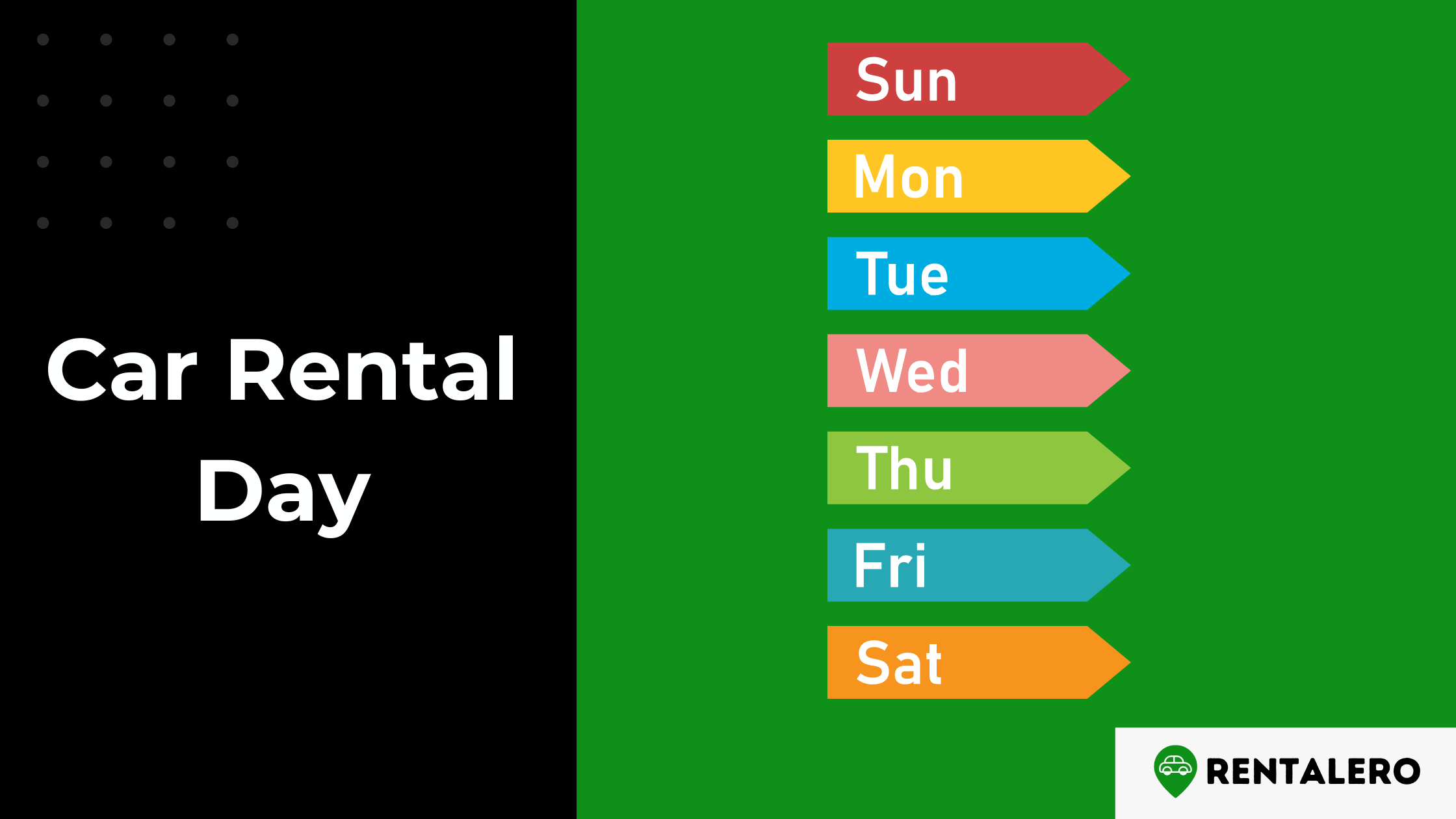You’ve planned your itinerary, and you’re all set to hit the road, but then you’re left scratching your head when understanding the car rental timeline. What exactly counts as a day in the world of car rentals?
In this article, we’re all about clearing up the confusion and helping you understand the nuts and bolts of how car rental companies calculate a “day.” It’s not always as straightforward as 24 hours, and companies may have different rules.
Advertising links are marked with *. We receive a small commission on sales, nothing changes for you.
Key Takeaways
- A rental day is generally any 24 hours from the time of pick-up. The rental period starts and ends with the times you specify for pick-up and drop-off.
- Some rental companies book rentals in 24-hour blocks, impacting the total cost of your rental period to exceed these blocks.
- Handling partial days, late returns, and early returns varies by company. Knowing these policies can help avoid extra charges.
- Reading and understanding your rental agreement, planning wisely, and communicating with the rental company is crucial for a smooth rental experience.
- Making the most of your rental period and avoiding unnecessary charges is possible with careful planning and an understanding company policies.
Defining a Car Rental Day
Here’s the scoop: Regarding car rentals, “day” might not mean exactly what you think it does.
So, let’s get to the bottom of this.
From Priceline to TripAdvisor, FlyerTalk to Car Rental Buddy, they all agree on one thing – in the rental car world, a “day” is typically any 24 hours from the time of pick-up.
So, if you nab a rental car at 2:00 p.m. on a Tuesday and return it at 2:00 p.m. on Wednesday, that’s considered a one-day rental. Simple, right?
You might wonder, “What happens if I return it at 2:01 p.m.?” Good question! It’s these little details that can trip people up. Of course, the answer can vary from company to company, but generally, rental car companies operate on a 24-hour clock, so even a minute over might push you into the next 24-hour period.
This could mean an extra day’s charge on your bill.
The 24-hour: Pick-Up and Drop-Off Times
Let’s dig a little deeper into this 24-hour concept. As we said, the clock starts ticking when you pick up your rental car. This is why knowing your pick-up and drop-off times is important when booking.
You’re golden if you plan to pick up your rental car at 9:00 a.m. on a Friday and return it at 9:00 a.m. the following day. That’s a one-day rental.
But here’s where it gets tricky: If you pick it up at 9:00 a.m. on Friday but drop it off at noon on Saturday, that will likely be counted as a two-day rental, even though you’ve had the car for 27 hours, not 48.
Why? Because you’ve crossed over into a new 24-hour period.
We know what you’re thinking: “That seems a little unfair.” we get it. But remember, these companies are juggling a lot of cars and a lot of bookings, and this system is the one that helps them keep things running smoothly.
Handling Partial Days, Late Returns, and Early Returns
The partial days
Let’s dive right into the next part of our journey – dealing with partial days. “What if I only need the car for a few hours?” you may ask. Well, this is where things get a little tricky.
In an ideal world, we’d only pay for the exact time we used the car, right? Well, in reality, it’s not quite so simple.
You see, even if you only use a portion of a 24-hour block (like we discussed earlier), you’ll generally still be charged for the whole block. This means the cost is typically the same whether you use the car for 2 or 22 hours.
The Late Returns
Next up on our list is the scenario of late returns. We’ve all been there – traffic jams, delayed flights, or maybe you lost track of time. Regardless of the reason, what happens if you return the car late?
Well, here’s the deal: Late returns often come with fees. Yep, unfortunately, that’s the way it goes. But here’s a lifesaver tip – if you suspect you’ll be late, call the rental company ASAP. They might be able to work something out and save you from those pesky late fees.
Early Returns
Let’s wrap this up with our final scenario: What happens if you return the car early? Well, you’d think you’d get a pat on the back for being so efficient, right? But hold onto your seatbelt for this one.
In some cases, returning a car early can result in a fee. That’s right, some rental companies might charge you for changing the agreed rental period.
It’s a bit of a downer, but being aware of these things is important. This is another reason to make sure you read the fine print and ask any questions before driving off the lot.
Practical Tips and Advice
Now that we’ve got the basics down let’s talk about putting that knowledge into practice. Here are some tried-and-true tips to navigate the car rental process.
Plan Your Pick-up and Drop-off Times Wisely
The first step to smart planning is understanding that car rental days are calculated on 24-hour hours. For instance, if you need a car for a weekend trip, picking it up early Friday morning and dropping it off late Sunday evening would technically be three days, not two.
Plan your times strategically to avoid paying for an extra day.
Know Your Rental Agreement
This cannot be stressed enough: know your rental agreement. This document is the bible of your rental journey, containing all the details about charges, late fees, early return fees, and much more. Read it thoroughly before you sign to avoid any surprises.
Avoiding Extra Charges and Maximizing Your Rental Period
Now, let’s look at how to avoid those extra charges and maximize your rental period.
Communicate with Your Rental Company
Always communicate with your rental company whether you’re running late or need to return the car early. They can provide options that might help you avoid additional fees.
Understand the Fuel Policy
Fuel policies can be a major source of additional charges. Some companies may require you to return the car with a full tank or charge a fee. Others might offer a pre-paid fuel option. Understand the policy and decide what’s most convenient for you.
Return the Car in the Same Condition
Any damage to the car, or even excessive dirtiness, can result in additional charges. Treat the rental car as you would your own to avoid these fees.
Consider the Full 24-Hour Block
Remember, you often pay for a full 24 hours, whether you use it or not. So why not make the most of it? Plan your schedule to utilize the entire rental period.
Conclusion
Navigating the world of car rentals can initially seem like a complex task, rife with nuances and fine print.
However, understanding the basis upon which rental days are calculated is a significant step towards demystifying the process.
It empowers you, the renter, to make informed decisions and avoid unexpected charges.
The 24-hour rule, while seemingly straightforward, can greatly influence your rental experience and the final cost. Therefore, planning your rental periods wisely ensures a seamless and cost-effective rental journey.
Frequently Asked Questions
What counts as a day in car rentals?
A day-in car rental is typically any 24 hours from the time of pick-up. So, for example, if you pick up a rental car at 9:00 a.m. on Friday and return it at 9:00 a.m. on Saturday, it is considered a one-day rental.
How do car rental companies handle late returns?
Policies vary by company, but most car rental companies charge late fees ranging from a per-hour to a per-day rate, which can quickly add up. Therefore, communicating with your rental company is essential if you anticipate a late return.
What happens if a rental car is returned early?
Returning a car early may or may not result in a refund, depending on the rental company’s policy. In addition, some companies may adjust the rate, potentially increasing the per-day cost.
How is a partial day charged for car rentals?
This depends on the company’s policy. For example, some may offer a grace period, after which hourly charges apply, while others may charge for an extra day.
How can I avoid additional charges for car rentals?
The best ways to avoid additional charges are to understand your rental agreement, plan your pick-up and drop-off times wisely, communicate any changes with your rental company, understand the fuel policy, and return the car in the same condition at pick-up.

Nzoputa has been writing for Rentalero since day one and is one of our most experienced members when it comes to the rental industry. For her, nothing beats Uber!
Advertising links are marked with *. We receive a small commission on sales, nothing changes for you.

